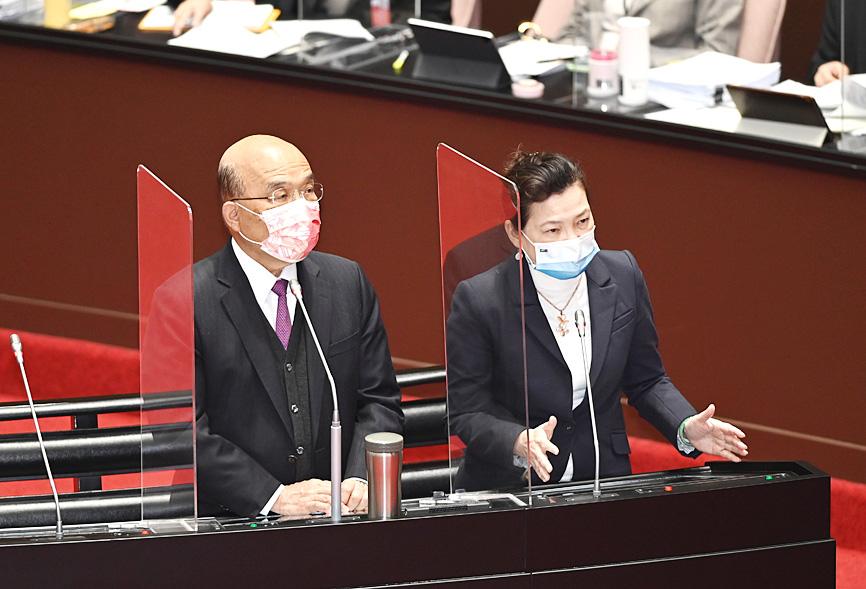The Ministry of Economic Affairs is planning to allocate NT$200 million (US$6.7 million) to help local food producers expand their overseas footprint, including in Asia and North America, to help them mitigate the impact of China’s import bans.
The subsidy program, dubbed “Taiwan Food Go to the World,” would provide guidance to food producers on marketing and finance to help them overcome difficulties due to import bans China imposed on Taiwanese food brands on Monday last week, the ministry said yesterday.
China is the third-largest export destination for local processed food companies, accounting for 20 percent of Taiwan’s overall processed food exports, the ministry said.

Photo: Tien Yu-hua, Taipei Times
The ministry is in talks with Redmart, Singapore’s biggest online grocery store, and Japanese online retailier Rakuten to sell Taiwanese food products, it said, adding that it hopes the initiative would give producers a boost as early as October.
The Council of Agriculture on Tuesday last week said the blacklisted companies include producers of tea leaves, dried fruits, honey, cocoa beans and vegetables, as well as the catches from about 700 Taiwanese fishing vessels.
China said the suspension was related to the companies’ compliance with a new customs registration system that it introduced in April last year.
However, several Taiwanese companies whose registrations on the system are up to date were also affected by the ban.
The government is promoting the sale of processed Taiwanese food products and agricultural products to other markets to help producers overcome the China trade challenges, Minister of Economic Affairs Wang Mei-hua (王美花) told reporters.
The government would help manufacturers market their products mainly in 13 countries, including Japan, Malaysia, Singapore, South Korea, the US and Vietnam, she said.
Companies that market their products on foreign Web sites would receive a subsidy of NT$100,000 and those that hold promotion activities can apply for a subsidy of NT$200,000 for up to five events each, she added.
The ministry would organize sales promotion events in countries such as Singapore and Malaysia, and participate in food-related activities and exhibitions, she said.
The program would benefit about 2,000 manufacturers, adding an expected US$60 million to their combined revenue, she said.
The ministry hopes the program can help companies diversify their target markets and bring Taiwanese delicacies to more countries, she said.
Additional reporting by Lisa Wang

SEMICONDUCTORS: The German laser and plasma generator company will expand its local services as its specialized offerings support Taiwan’s semiconductor industries Trumpf SE + Co KG, a global leader in supplying laser technology and plasma generators used in chip production, is expanding its investments in Taiwan in an effort to deeply integrate into the global semiconductor supply chain in the pursuit of growth. The company, headquartered in Ditzingen, Germany, has invested significantly in a newly inaugurated regional technical center for plasma generators in Taoyuan, its latest expansion in Taiwan after being engaged in various industries for more than 25 years. The center, the first of its kind Trumpf built outside Germany, aims to serve customers from Taiwan, Japan, Southeast Asia and South Korea,

Gasoline and diesel prices at domestic fuel stations are to fall NT$0.2 per liter this week, down for a second consecutive week, CPC Corp, Taiwan (台灣中油) and Formosa Petrochemical Corp (台塑石化) announced yesterday. Effective today, gasoline prices at CPC and Formosa stations are to drop to NT$26.4, NT$27.9 and NT$29.9 per liter for 92, 95 and 98-octane unleaded gasoline respectively, the companies said in separate statements. The price of premium diesel is to fall to NT$24.8 per liter at CPC stations and NT$24.6 at Formosa pumps, they said. The price adjustments came even as international crude oil prices rose last week, as traders

Taiwan Semiconductor Manufacturing Co (TSMC, 台積電), which supplies advanced chips to Nvidia Corp and Apple Inc, yesterday reported NT$1.046 trillion (US$33.1 billion) in revenue for last quarter, driven by constantly strong demand for artificial intelligence (AI) chips, falling in the upper end of its forecast. Based on TSMC’s financial guidance, revenue would expand about 22 percent sequentially to the range from US$32.2 billion to US$33.4 billion during the final quarter of 2024, it told investors in October last year. Last year in total, revenue jumped 31.61 percent to NT$3.81 trillion, compared with NT$2.89 trillion generated in the year before, according to

PRECEDENTED TIMES: In news that surely does not shock, AI and tech exports drove a banner for exports last year as Taiwan’s economic growth experienced a flood tide Taiwan’s exports delivered a blockbuster finish to last year with last month’s shipments rising at the second-highest pace on record as demand for artificial intelligence (AI) hardware and advanced computing remained strong, the Ministry of Finance said yesterday. Exports surged 43.4 percent from a year earlier to US$62.48 billion last month, extending growth to 26 consecutive months. Imports climbed 14.9 percent to US$43.04 billion, the second-highest monthly level historically, resulting in a trade surplus of US$19.43 billion — more than double that of the year before. Department of Statistics Director-General Beatrice Tsai (蔡美娜) described the performance as “surprisingly outstanding,” forecasting export growth